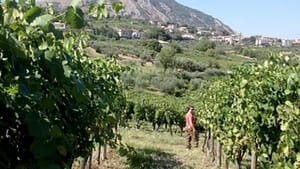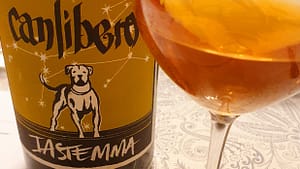Last Monday’s tasting in my private wine club was dedicated to wines from southern half of Italy, most of them from the grapes falanghina, fiano and greco di tufo. And it was the former, the only one without a DOCG, that excelled the most.
Ennio Romano Cecaro and his wife Mena cultivate four hectares in Benevento in the Campania region. The vines are between 60 and 90 years old, biodynamically farmed.
The cellar is built in an old tufo cave under the house where the couple lives, and the vinification is very simple. All the wines get a long skin-maceration in steel tanks, and no filtration or additions of any kind are carried out. The annual production is no more than 3.000 bottles.
This week’s wine fermented in open tubs, stayed five months on the skins and was bottled without addition of sulphites, clarification or filtration. I have tasted quite a few wines from the producer at natural wine fairs and bars. And once again convinced: Yes, Canlibero can!
Iastemma 2018 (Canlibero)
Amber, slightly turbid. Complex aroma of orange peel, white flowers, and a light volatility, over a layer of anise and honey. Sapid, lightly textured with integrated acidity, long.
Price: Medium
Food: Salads, light meat, fried fish, sushi, fermented food, Asian…
Leave a Comment




